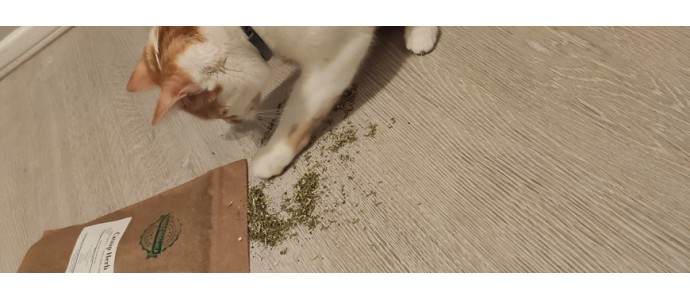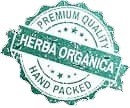Herbs for Pets

Herbs have been used for centuries; they were historically the first raw material used to treat humans and animals. These days, herbal medicine and prophylaxis with the use of plant materials are gaining more and more recognition among animal owners.
Of course, there are some rules about the number of herbs to be administered to the animals. We should give pets 2-3g of raw material per 1kg of body weight in the case of dry products, while water extracts are prepared in the ratio of 1:10, i.e. 1l of water per 100g of raw herbal material. Before starting the treatment, it is also worth knowing what forms of herbs can be used for animals.
When it comes to infusions, a suitable amount of raw material is poured over with a specific amount of boiling water and then left for 20–30 minutes, covered. After that time the infusion should be strained and given to the animal.
In the case of hard/dry products (such as roots, rhizomes, seeds), it is worth using a decoction. The shredded raw material is poured over with cold water and heated on a slow fire (not allowing it to boil) for about 30 minutes.
For topical application, compresses are also used - soak a thick layer of material (lignin, gauze) with the prepared herbal extract, put it on the affected area, cover it with foil and leave it for 30 minutes.
Herbs for your pet
It is most often used orally as an anti-inflammatory agent and has antiallergic properties. It exhibits sedative properties, which are especially important in the treatment of itching. Chamomile herbal tea or tincture is useful in treating indigestion, gas, and vomiting. Chamomile made into a tea can be given for stomach issues.
Burdock is a very effective herb for detoxifying the body. It also has a diuretic effect that helps eliminate harmful waste from the body. A decoction made of Burdock Root should be mixed with the dog's and cat’s food.
This herb has a mild, calming effect on most animals. Catnip Herb is effective in treating anxiety, nervousness, and insomnia. It stimulates appetite and aids digestion. If your pet is nervous and restless under stressful situations, such as visiting the vet, long car trips, etc., try sprinkling dried Catnip Herb (1/8 to 1/2 teaspoon per kilogram of food). ) onto their food.
Eyebright Herb is often used in the treatment of diseases related to the eyes (decoctions). Infusions are used for washing or for making compresses. Due to its anti-inflammatory and disinfecting properties on the skin and mucous membranes, eyebright is also often used to treat allergic conditions affecting the eyes, ears, sinuses, and nose.
The seeds of this plant contain a large amount of essential fatty acids, which are essential for the proper development and maintenance of the brain, liver, heart, and immune system. Fatty acids are essential for improving and maintaining healthy skin, coats, and claws in cats and dogs. Flaxseeds can be easily added to food.
Due to its high nutritional value, this herb provides nutrients to the entire pet body. Dried nettles can be added to the food (1/2 teaspoon / 0.5 kg of feed). Stinging Nettle Leaves of this plant can be used to rinse the skin and coat - it will nourish it, relieve itching caused by flea bites, eczema, and other skin diseases.
Calendula is a plant that can be used for all types of open wounds. Calendula Petals ointment is excellent for treating minor injuries, bites, and abrasions. It brings soothing relief almost immediately, while its antibacterial properties accelerate wound healing. Calendula Petals infusion can be used as a skin cleanser for various forms of skin diseases, such as flea bites, eczema, and poison ivy.
It is a rich source of vitamins A, E, and K and has antibacterial and antiseptic properties. Moreover, Sage Leaves contain B vitamins, vitamin C, β-carotene, resin compounds, and mineral salts. It is used to treat flatulence, arthritis, and skin problems.
It is helpful in skin allergies, irritation, itching, inflammation on the skin. Add Borage Herb to the bath, as it perfectly soothes irritated skin.
In herbal medicine, milk thistle is often used to help improve liver health. Thanks to the silymarin contamination, it is also an antioxidant and anti-inflammatory product. Milk Thistle Seeds should be ground in a grinder or crushed in a mortar. Serve after mixing with feed. Dogs - 1 g of the product per 5 kg of dog's body weight per day. Cats - 1g of the product per adult cat per day.
Rock Rose can be used as a daily dietary component supporting immunity and health, increasing the natural protective barrier against external parasites, neutralizing unpleasant odours, as a daily supplement to the diet of adult dogs and cats prone to allergies. Rock Rose can be mixed with food in the following ratio: dogs - 1 g of the product per 5 kg of dog's body weight per day; cats - 1g of the product per adult cat’s weight per day.
Raspberry Leaves have an astringent (drying up) effect due to their tannin content which helps to tone tissues. It is this property that makes Raspberry Leaf so useful as a herbal remedy in treating diarrhoea and in helping check haemorrhage during and after kittening or whelping. It helps restore balance to the female reproductive system.
It has anti-inflammatory, anti-allergic, antibacterial, and antiviral effects. Licorice Root has also been shown to stimulate the immune system. Can be given to pets in a form of decoction added to food.
Rosehip Peels support a healthy immune system. They are nutritionally important for healthy bones, skin, and coat as they are rich in antioxidants and Vitamin C. In terms of health benefits, taking Rosehip shells will help with anaemia, immune systems.
Barley Grass is rich in nutrients and supports animal cells and the nervous system, it relieves anxiety. It supplies pet blood with important oxygen and also contains a high proportion of calcium, magnesium, and phosphorus. Barley Grass has a positive effect on the bones and muscles. Cats sometimes like to lick Barley Grass Powder, so you can add it to their food or give them in a separate bowl.
Dandelion Leaves are a rich source of vitamin A and inulin, which encourage the growth of beneficial bacteria in the intestinal tract. Dandelion also contains vitamins C, E, and K, as well as other valuable nourishing elements. Dandelion Root supports liver function, improves tooth enamel, and acts as a blood tonic. It supports the cardiovascular system and promotes healthy bones.
Lavender Flower is anti-bacterial, astringent, analgesic, and antispasmodic properties. This herb supports your pet’s nervous system, joints, respiratory tract, and skin in a natural way. Lavender Flower can be given to pets in a form of infusion or sprinkled on the food.
As you can see, there are a lot of herbs that may help in different ailments of your pets. This text obviously doesn’t mention all of them, but strictly the most common in use for your pet’s health. When starting herbal therapy, you have to remember that the effects of using herbal treatments are visible after a month or two of regular use. Herbs bring a lot of good for humans and animals' health. However, if you want to give them to your pet in higher doses - be sure to consult an experienced veterinarian who can advise you regarding dosage and any way of preparing it for your pet.

Comments
Leave your comment